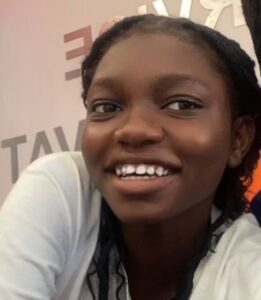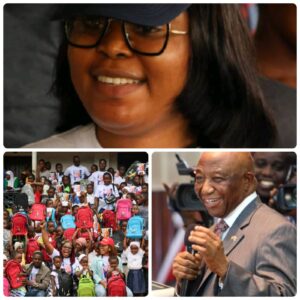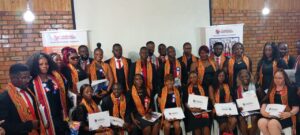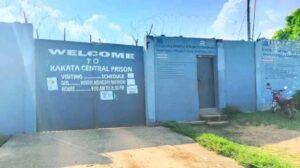To Preserve Crops amid Climate Change, Physically Challenged Farmers Seek More Support
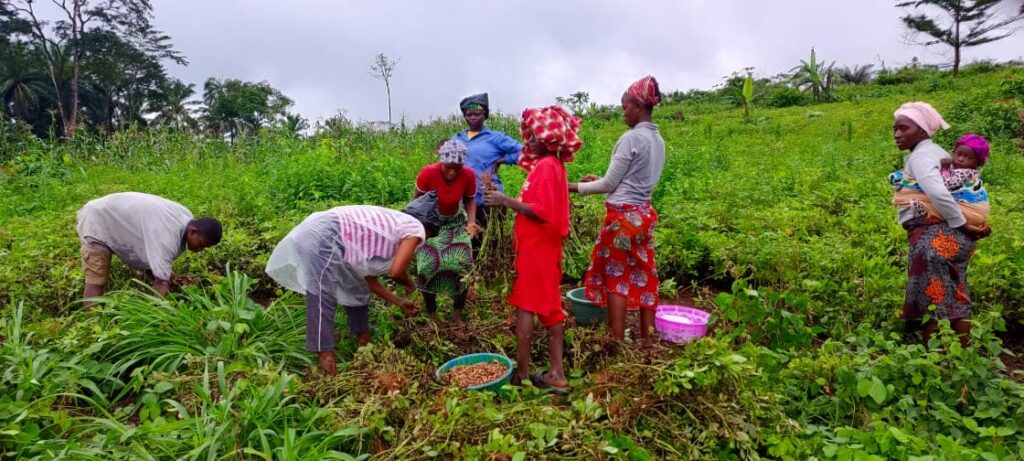
By Victoria Wesseh, +231 77 814 7938, FeJAL Mentorship Fellow
Lofa County, Liberia: Over hundred physically challenged formers who are engaged into agricultural activities in Lofa county are seeking support from the Government of Liberia, local and international partners to preserve their crops due to Climate Change impact.
The women farmers under the banner, “Lofa United Blind Association”, noted that they got involved into agriculture to promote alternative livelihood and self-empowerment.
According to them, engaging in agriculture is one ways they can sustain themselves and their families and rise above public stigmatization they are currently faced with in Lofa county and other parts of the country.
Physically Challenged people are often time seen around the capitol building and other Government offices seeking financial assistance from government officials, lawmakers, Staff and visitors relying on handouts to make ends meet. Their living conditions are extremely deplorable due to their disabilities and lack of opportunities to empower themselves.
Most of them are challenged with getting daily meals, better bathrooms and toilets facilities as well as the accumulation of garbage around places they dwelled which poses a significant health risk to their community. The National Commission on Disabilities the body currently has 280,000 United States Dollars in the FY 2024 budget which many think its unable to cater for disabled people in Liberia.
The Physically Challenged farmers explained that most of them did not have the opportunity to go to school to acquire formal education due to their condition thus making it difficult to easily get employment in both the private and public sectors.
Ma Miatta Kolvah, one of the physically challenged women said, “Some of us are educated but most of us did not go to school due to our different conditions, the lack of conducive environment for people living with disabilities has made our condition even worse, take a look at our different high school and universities, what about vocational training centers?”. She continues “We see it very important to group ourselves and take advantage of to the availability of the vast and fertile land space to be able to cater for our children and family members since we cannot be absorbed in Government and private sectors due to our disabilities”.
According to Ma Miatta, the idea of the group getting involved in agriculture activities was birthed over the last four years. She, however, regretted that despite all of what they put in agricultural work, the first quantity of harvest was very poor due to climate change (difference in the sun, soil and rain). “It was because of this, we decided to change the crops to Corn, Beans, and Grand nuts”.
Ma Miatta said the group for the past two years is being supported by the Ministry of agriculture through the International Funds for Agriculture Development Projects but there is need for more support due to the widespread impact of climate change.
Climate Change is long-term changes in temperature, precipitation, and other atmospheric conditions on Earth. It is primarily driven by human activities, such as the burning of fossil fuels, deforestation, and industrial processes which increase the concentration of greenhouse gases in the atmosphere, leading to global warming altering weather patterns. Climate Change poses significant challenges to agriculture, with potential effects on crop yields, water availability, soil health, and food security while adapting to these changes will be crucial for ensuring a stable and resilient food supply in the future.
Aaron Sonah is another physically challenged person who is excited of being involved with such activity. He said despite their condition, they still have the capability, creativity and mindset of doing something. Sonah noted that although they are disabled but they have the innovative minds of mobilizing people in working with them.
“People always see our disability, it’s about time we see our ability, they called us disabled but we called ourselves differently, although some of us can’t see, walk or talk but we have the capabilities, ideas and mindset to do something for ourselves”, Sonah narrated.
He added “When we started in 2023, we planted Okra, Pepper, Cucumbers among others to enable us raise money to cultivate more land and add additional crops to the ones we started planting, but the limited support we have can’t do it, agriculture is actually profitable, but it requires a lot including land space, manpower and the requisite agriculture materials”.
Speaking further, a ranking member of the group, Mr. Musa Kamara spoke about the need to provide quality bull illiteracy education meant for the blind and other challenged disabled people. He said bull education is a special form of education that is used to teach visually impaired people how to read and write.
“This type of education was introduced here in Lofa County on November 7, 2014, and although at some point it was not effective until 2022 through the help and support of an organization called Friends of Liberia owned by some Liberians base in the United States.
Mr. Kamara noted that currently the association lacks the support to effectively run the program and is calling on the government and other goodwill Liberians to support them with school materials such as stairs, slap, parking bill etc
Famata Kamara an executive of the group said she has been working on the farm and expressed the hope that they will continue to work together to promote agricultural activities. “One other problem we started experiencing is the fertility of the soil because we do not have the capacity to do soil testing to determine whether we can extend other activities to other places or not” She was concerned about drop in the membership of the group due to limited income to cater to for the wellbeing of over hundred members as was done in the past. “We started with a membership of more than One hundred persons, but the number has drastically reduced, and one major factor is the lack of funding.”
Famata Kamara wants the Government of Liberia through the Ministry of Agriculture to assist the group with soil tester and other agricultural materials as well as a grant to enable the group to extend its activities across Lofa county.
For her part, Ma Vargular Kollie, not a disable, but one of the oldest ladies in the group said she decided to join the group to motivate others that people with disability are not an indication that they cannot get involve into activities that are profitable.
“I am a active member of the group who continues to encourage our members that working with persons with disability has its own uniqueness, at times, these people don’t even have food to eat but I do my best to intervene and provide because I have always wanted to help people with disability, Ma Kollie said.
Mr. William Massaboi a monitoring and evaluation officer at the International Funds for Agriculture Development Project (IFFAD) praised the group for such innovation. He said his group will continue to support the Lofa United Blind Association Agriculture Farm project which started in 2023 with a startup amount of One Hundred Sixty Thousand US dollars.
According to Mr. Massaboi, IFFAD assessed the capability of the association and noticed that they have been doing vegetable production in Voinjama. “IFAD does not provide financial support but rather providing them with agriculture materials and tools which include shovels, rakes, water pump machine, power tailor machine which is intended to help expands to three or four heaters of land for agriculture production. He noted that his institution also provided vegetable seed, cabbage seed, watermelon seed and some local seeds to boost the production.
”IFAD is not just providing support, but rather helping to expand their production which will lead to alternative likelihood where they can be able to share among themselves and have a saving for the sustainability of the organization”. He said the provision of additional support has not been known yet because they are working with many women groupings in other parts of the county.
Mr Massaboi said there are lot more challenges associated with working with Physically Challenged people especially those involved with agricultural activities due to their conditions. He named the lack of coordination, misused of project equipment and lack of willingness as a major problem faced with working with disabled community.
This story was produced under the Female Journalists Association of Liberia (FeJAL) Mentorship.
